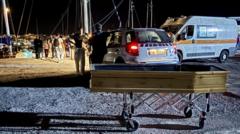The Italian government has officially sanctioned a monumental €13.5 billion ($15.6 billion) plan to construct the world's longest suspension bridge, which will link Sicily with Calabria, located at the southern tip of Italy. Advocates for the project assert that it will be designed to withstand seismic activity, given its location in a region known for earthquakes.
This undertaking marks yet another attempt to advance the Messina Bridge project, which has faced numerous hurdles over the years, including financial, environmental, and safety concerns, as well as fears of interference from organized crime. Prime Minister Giorgia Meloni acknowledged the difficulties but emphasized her belief that this investment is pivotal for the nation’s future. "We embrace challenging projects when they are worthwhile," she stated.
The finalized design features a bridge spanning 3.3 km (2.05 miles) between two towering pillars, each standing 400 meters (1,300 feet) tall. Plans incorporate dual railway lines at the center and three lanes of traffic on either side. Additionally, the Italian government aims to classify the bridge as a military expense, which would contribute to the EU's defense spending requirement of 5% of GDP.
Transport Minister Matteo Salvini, a member of Meloni's ruling coalition, expressed optimism regarding the completion timeline, projecting that the bridge could be built between 2032 and 2033. He also claimed that it has the potential to generate 120,000 jobs per year and stimulate economic development in Sicily and Calabria, two of Europe's most economically disadvantaged regions.
However, for the project to progress, it still requires the endorsement of both the Italian Court of Auditors and environmental organizations on national and EU levels. Local inhabitants and property owners in the vicinity may also contest and challenge the decision, which could result in further delays.
The ambitious bridge project has faced a long history of setbacks since its inception over 50 years ago, with past proposals being abandoned for various reasons. It has consistently faced opposition due to concerns about financial mismanagement, particularly with fears that criminal organizations could siphon off public funds.
Local politicians have voiced their objections to the government's decision. Senator Nicola Irto from the Democratic Party labeled the project as "controversial and divisive,” pointing out that it could divert essential resources away from local infrastructure and public services such as healthcare and education. Giusy Caminiti, the mayor of Villa San Giovanni—the site on the Calabrian side of the Strait—has expressed anxiety about the repercussions for her community and has called for further dialogue.
Opposing factions, including the grassroots committee "No to the Bridge," condemned the announcement, asserting it was motivated by political interests rather than careful examination of technical feasibility. Critiques also include environmental concerns, particularly regarding water usage in a region already prone to drought, as construction could consume millions of liters of water daily.
As it stands, the only current means for rail travel between Sicily and Calabria involves transporting train coaches via ferry across the Strait, which takes approximately 30 minutes.
This undertaking marks yet another attempt to advance the Messina Bridge project, which has faced numerous hurdles over the years, including financial, environmental, and safety concerns, as well as fears of interference from organized crime. Prime Minister Giorgia Meloni acknowledged the difficulties but emphasized her belief that this investment is pivotal for the nation’s future. "We embrace challenging projects when they are worthwhile," she stated.
The finalized design features a bridge spanning 3.3 km (2.05 miles) between two towering pillars, each standing 400 meters (1,300 feet) tall. Plans incorporate dual railway lines at the center and three lanes of traffic on either side. Additionally, the Italian government aims to classify the bridge as a military expense, which would contribute to the EU's defense spending requirement of 5% of GDP.
Transport Minister Matteo Salvini, a member of Meloni's ruling coalition, expressed optimism regarding the completion timeline, projecting that the bridge could be built between 2032 and 2033. He also claimed that it has the potential to generate 120,000 jobs per year and stimulate economic development in Sicily and Calabria, two of Europe's most economically disadvantaged regions.
However, for the project to progress, it still requires the endorsement of both the Italian Court of Auditors and environmental organizations on national and EU levels. Local inhabitants and property owners in the vicinity may also contest and challenge the decision, which could result in further delays.
The ambitious bridge project has faced a long history of setbacks since its inception over 50 years ago, with past proposals being abandoned for various reasons. It has consistently faced opposition due to concerns about financial mismanagement, particularly with fears that criminal organizations could siphon off public funds.
Local politicians have voiced their objections to the government's decision. Senator Nicola Irto from the Democratic Party labeled the project as "controversial and divisive,” pointing out that it could divert essential resources away from local infrastructure and public services such as healthcare and education. Giusy Caminiti, the mayor of Villa San Giovanni—the site on the Calabrian side of the Strait—has expressed anxiety about the repercussions for her community and has called for further dialogue.
Opposing factions, including the grassroots committee "No to the Bridge," condemned the announcement, asserting it was motivated by political interests rather than careful examination of technical feasibility. Critiques also include environmental concerns, particularly regarding water usage in a region already prone to drought, as construction could consume millions of liters of water daily.
As it stands, the only current means for rail travel between Sicily and Calabria involves transporting train coaches via ferry across the Strait, which takes approximately 30 minutes.





















